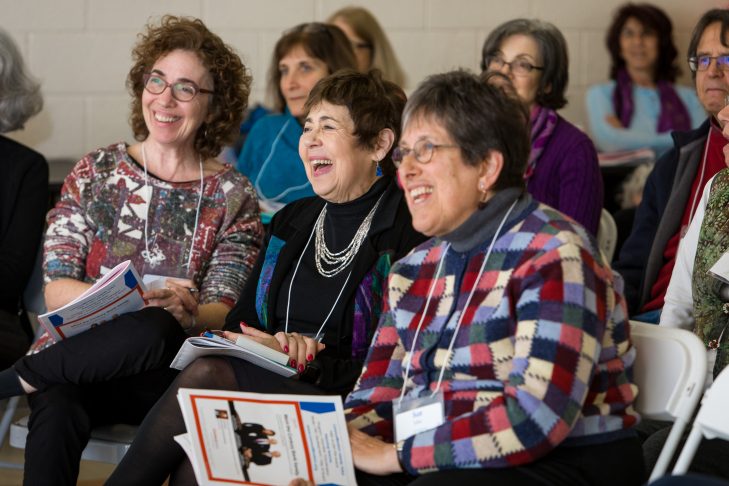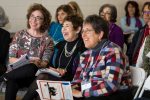The Hebrew word limmud means “learning,” and this Sunday, Dec. 2, there will be plenty of Jewish learning happening at the ninth annual LimmudBoston conference. The conference, which takes place from 9 a.m. to 5:30 p.m. at Temple Reyim in Newton, offers a wide array of workshops ranging from spiritual meditation to understanding the needs of interfaith families.
Since its founding in England in 1980, Limmud has evolved into a global enterprise. One can find Limmud conferences across five continents, in places such as Buenos Aires, Sydney and Berlin. In the United States, cities hosting Limmud conferences include New York, Philadelphia, Atlanta and Chicago. The organization’s website reports that over 35,000 people worldwide have experienced Limmud in over 80 venues. Steffi Karp brought Limmud to Boston after attending the conference in Atlanta in 2008. In 2009 she launched the Boston iteration and has seen it expand its offerings ever since.
LimmudBoston board member Naomi Gurt Lind told JewishBoston that close to 200 people have registered for Sunday’s event. According to Gurt Lind, Limmud’s diversity will again be showcased at this year’s LimmudBoston. Diversity is one of the stated values Limmud participants all over the world encounter in a weekend of learning. Other values include expanding Jewish horizons, respect and one that is distinctively Jewish: arguments for the sake of heaven—reverentially agreeing to disagree on various points of Jewish law and observance. However, the organization explicitly states that it “does not participate in legitimizing or delegitimizing any religious or political position found in the worldwide Jewish community. Anyone who comes to Limmud events seeking opportunities for this will not find it.”
- What participants will find at LimmudBoston are over 80 workshops addressing myriad Jewish viewpoints on culture, social justice issues and current events. Stacie Garnett-Cook will present a session entitled, “Don’t Say ‘Non-Jew:’ How to Embrace Interfaith Families.” Garnett-Cook told JewishBoston: “With 71 percent of progressive Jews—non-Orthodox—marrying someone of a different faith, interfaith couples and families are an important part of the Jewish community. Many of our organizations want to be inclusive, and this workshop will give participants new language and ideas to more fully embrace interfaith families.” She added that many people know someone in an interfaith relationship, making her workshop relevant on a personal as well as communal level.
On the cultural side of things, Barry Schneider will identify Jewish moments in modern American film. Over email, Schneider told JewishBoston that his course— “Understanding the Jewish Moments in Mainstream Feature Films”—“will focus on the ‘Jewish moments’ that appear, often unexpectedly, in selected feature films. Often these momentary experiences occur among characters who were not previously identifiable as Jewish or who sought to minimize their Jewish identities.” Schneider plans to bring in scholarly insights from the fields of film studies and Jewish studies.
Steven Green hopes participants in his workshop on “Jewish Contemplation and Meditation” will take away “techniques to incorporate meditation into our modern lives and demonstrate the efficacy of the practice as an important tool in ‘doing’ Jewish and going deeper into spiritual practice.”
Other offerings have the opportunity to engage in topics that include adoption in the Jewish community, Israeli-Palestinian peace and climate change. Presenters will include professor Jonathan Sarna teaching about “America, American Jews and the Land of Israel—From Colonial Days to Our Days.” Rabba Sara Hurwitz’s workshop will explore “Between Hubris and Humility (And the Space In-Between). Professor Rachel Adelman of Hebrew College will offer a session on “Weaving the Messianic Light: Modern Midrash on the Book of Ruth.”
“What I love about Limmud,” said Gurt Lind, “is the way learning and community are fused—it’s so much fun to see friends from different parts of my life and to learn with and from them. The variety of sessions means there are plenty of options for exploring new ideas. It’s exciting to see how the different presenters work off each other in interesting ways—for example, one session proposed by the Arava Institute grew into a multi-presenter panel with folks from Kids4Peace, Middle East Entrepreneurs of Tomorrow, Yad b’Yad and Science Training Encouraging Peace. The program team has really done a great job of cultivating variety and depth.”
Never miss the best stories and events! Get JewishBoston This Week.




